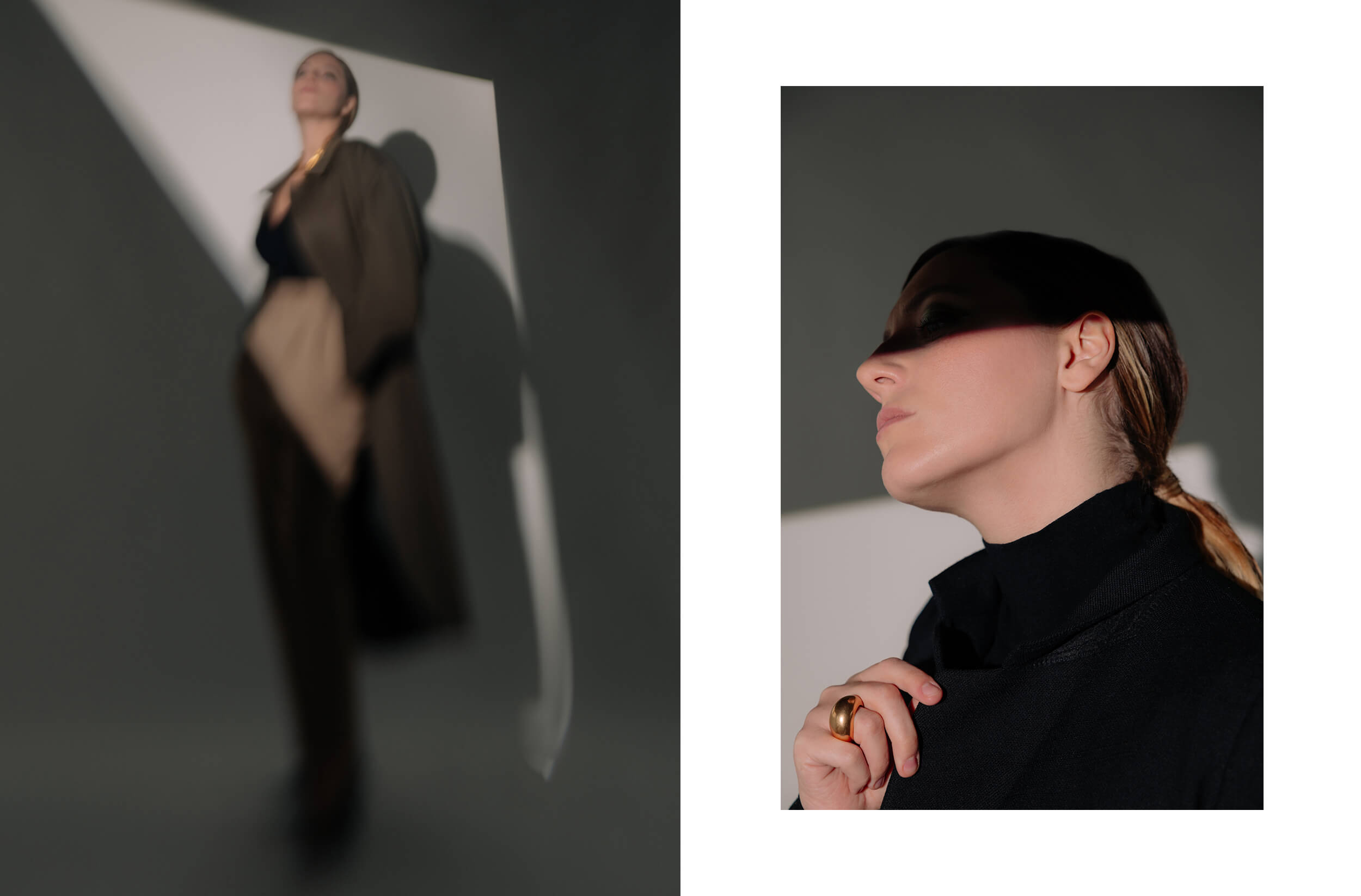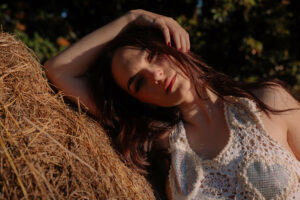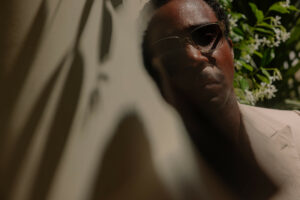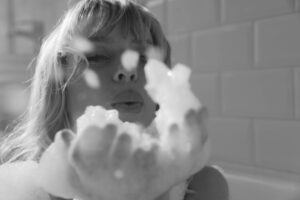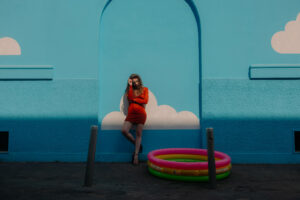In the fascinating and raw world of “This is Not Hollywood”, a TV series that delves deeply into the darkest folds of Italian crime news, Giulia Perulli stands out with a performance that leaves a mark, portraying Sabrina Misseri, a character as complex as it is controversial. With Giulia, a potentially intricate conversation unfolded, which turned out to be genuine and moving, touching on various key points of the actor’s craft, living the script.
Giulia spoke to us about her physical and emotional transformation, revealing the details of an all-encompassing journey that challenged her to fully immerse herself in a painful reality. With honesty, Giulia acknowledged the impact of the role of Sabrina on her personal and professional life and the delicate balance between recounting a procedural truth and exploring the psychological dynamics of a character and a human being.
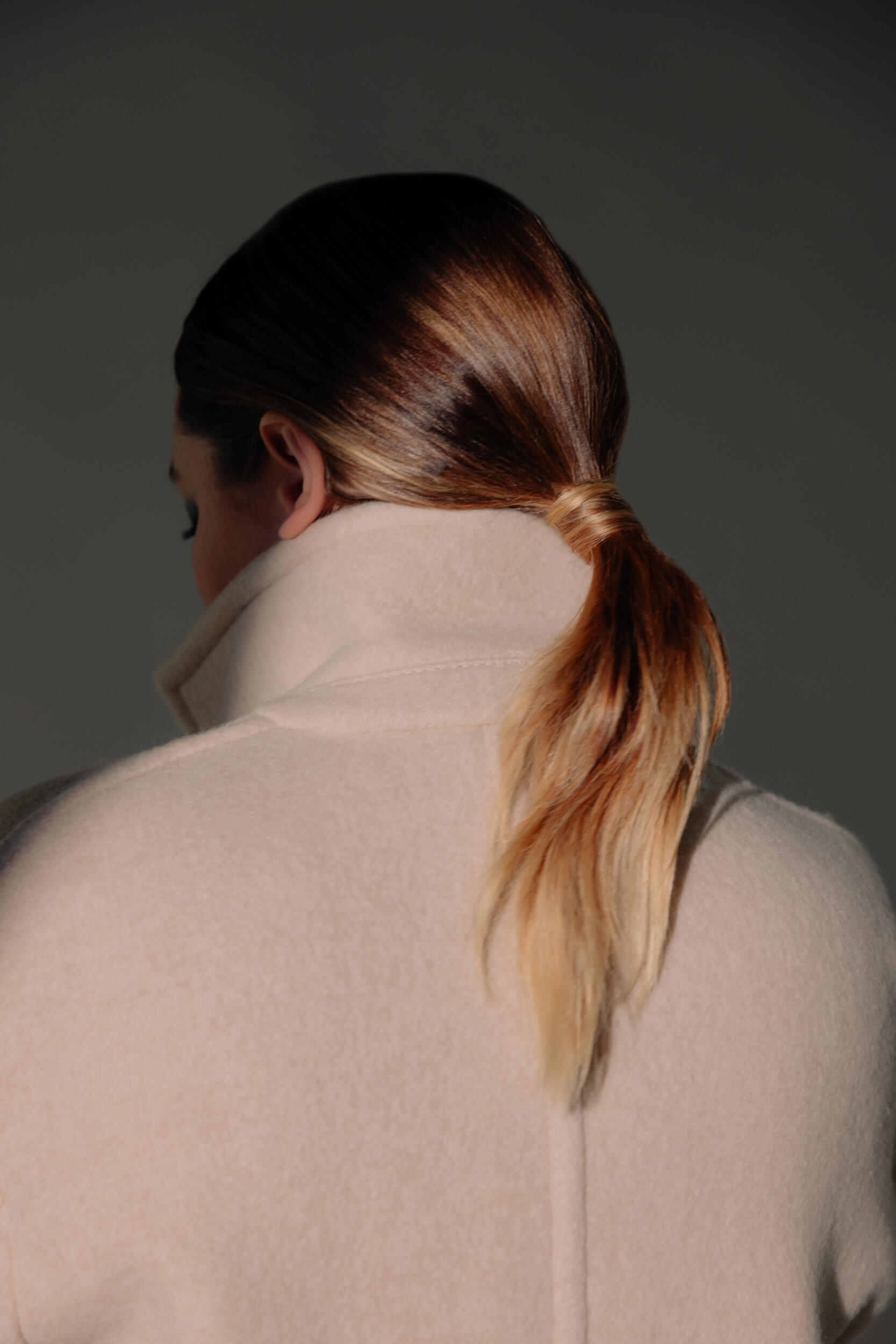
What is your first cinema memory?
What a lovely question… You know, I don’t really have a clear memory of the moment I realized I wanted to be an actress. It’s quite a broad topic. I discovered cinema at a fairly young age because usually when you’re little, you watch cartoons, but I asked my mother to watch films. I’ve always been “wise”, showing more maturity than I probably should have had as a child, perhaps partly out of shyness. I am very shy, and that is one reason I find myself taking refuge in characters. One of the first films I saw as a young girl that captivated me was “Notting Hill.” My father is a big fan of Julia Roberts; he adores her, so it was a film that often played in our house, and I watched the DVD on a loop, knowing all the lines by heart [laughs]. I really liked Julia Roberts’ character, an actress wrapped in mystery, fascinated by the craft, so who knows, maybe she dug into my personality and left a self-suggestion.
As a child, I also watched many films, and I am convinced that where I am now, the job I have, has been influenced by this: my parents would take me to the cinema every Sunday, and they had me watch many films, some perhaps even unsuitable for my age [laughs]. But I will be forever grateful to them for this.
Sure! Well, cinema is a way to tell stories, whether true or fictional, but in some way, it presents possible scenarios projected on the screen. For the viewer, it’s an emotional experience and a way to travel, to experiment. For instance, it seems to me as if I’ve been to Notting Hill, even though I’ve never actually been to London!
I believe cinema is one of the deepest forms of art, and it’s as if it were a school; personally, it has shaped me a lot: staying home and watching a film probably equaled attending a literature class.
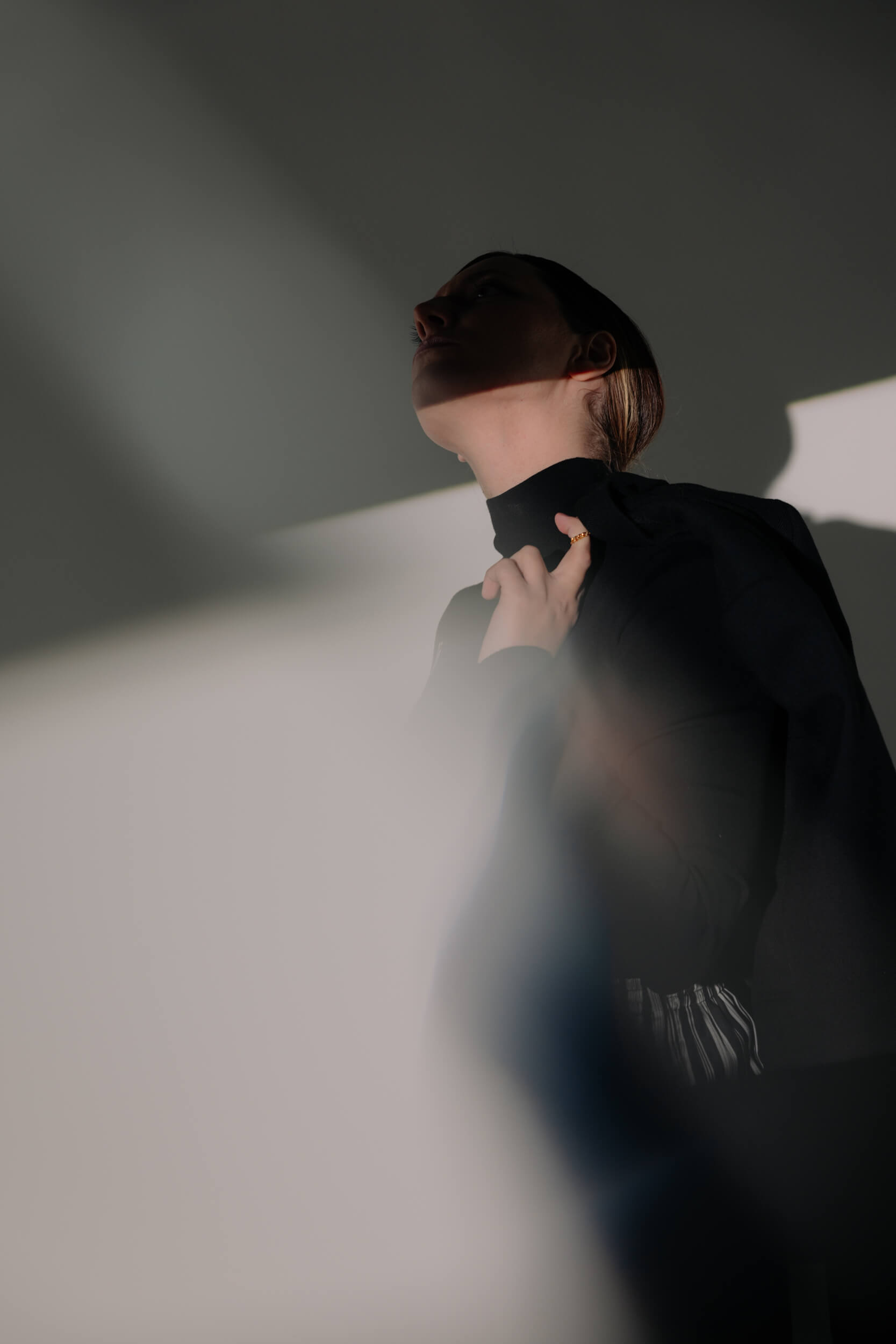
What was your first reaction when you received the script? And what drove you to accept such a delicate role?
The first thing I asked myself was: where do I start now?
I was surprised when I found out they had entrusted me with the role of Sabrina because, both physically and in terms of character dynamics, I was and am totally opposite to who I had to portray, and in Italy, roles tend to be given to actors already suited for the character. So, initially, I was very surprised by Pippo [Mezzapesa]’s choice to entrust me with this role and by Disney and Groenlandia who supported Pippo’s idea of giving me this role. I documented myself a lot through video material: I went online and searched for videos on Avetrana and the character I had to portray, refreshing my memory of the crime, which I already knew. At the time of the events, I was Sarah’s age, 15 years old, and I remembered the Avetrana crime perfectly also due to a geographical factor, as I was born and raised in Lecce. At the time of the events, you know, in the provinces of Lecce, Brindisi, and Taranto, these self-suggestions were going around, and I remember my mother wouldn’t let me go to school alone because there were rumors about this white van kidnapping young girls. Back then, everything was still up in the air; Sarah hadn’t been found, and her uncle hadn’t confessed yet. I watched and rewatched hundreds of times the videos of Sabrina’s pleas, and the interviews she gave, absorbing her physical details, her walk, attitude, posture, voice, and breathing. Sabrina has quite a noticeable micro-facial mimicry among the details I reported back into the script as I studied and memorized, and with each line, I tried to refine these aspects of the character.
A truly challenging and fascinating job, for a complex character, trapped in a mix of jealousy, insecurities, and social pressures. A character discussed and judged by public opinion. How did this responsibility influence your approach to the work?
Sabrina entered the homes of Italians and beyond, and we remember her for this. I tried to eliminate all kinds of prejudice because when you play a character, you mustn’t judge them, and this is fundamental; otherwise, you can’t empathize. I tried not to judge her and forget I was playing the character everyone knows. I tried to find a coherent key to Sabrina, even though I would have preferred to call her by another name – let me just say I played a character who, by pure chance, is named Sabrina Misseri. Before reaching that Sabrina, there was a preparation where I tried to embrace the project with generous acting: to play this role, I gained 22 kg, followed by a nutritionist to achieve that physique, and it was great to experiment.
This series was an all-encompassing experience, both emotionally and physically, because it allowed me to challenge myself as an actress, also being my first lead role. I felt the responsibility of portraying this controversial character, but at the same time, I was enthusiastic about the idea of being among the main members of the cast.
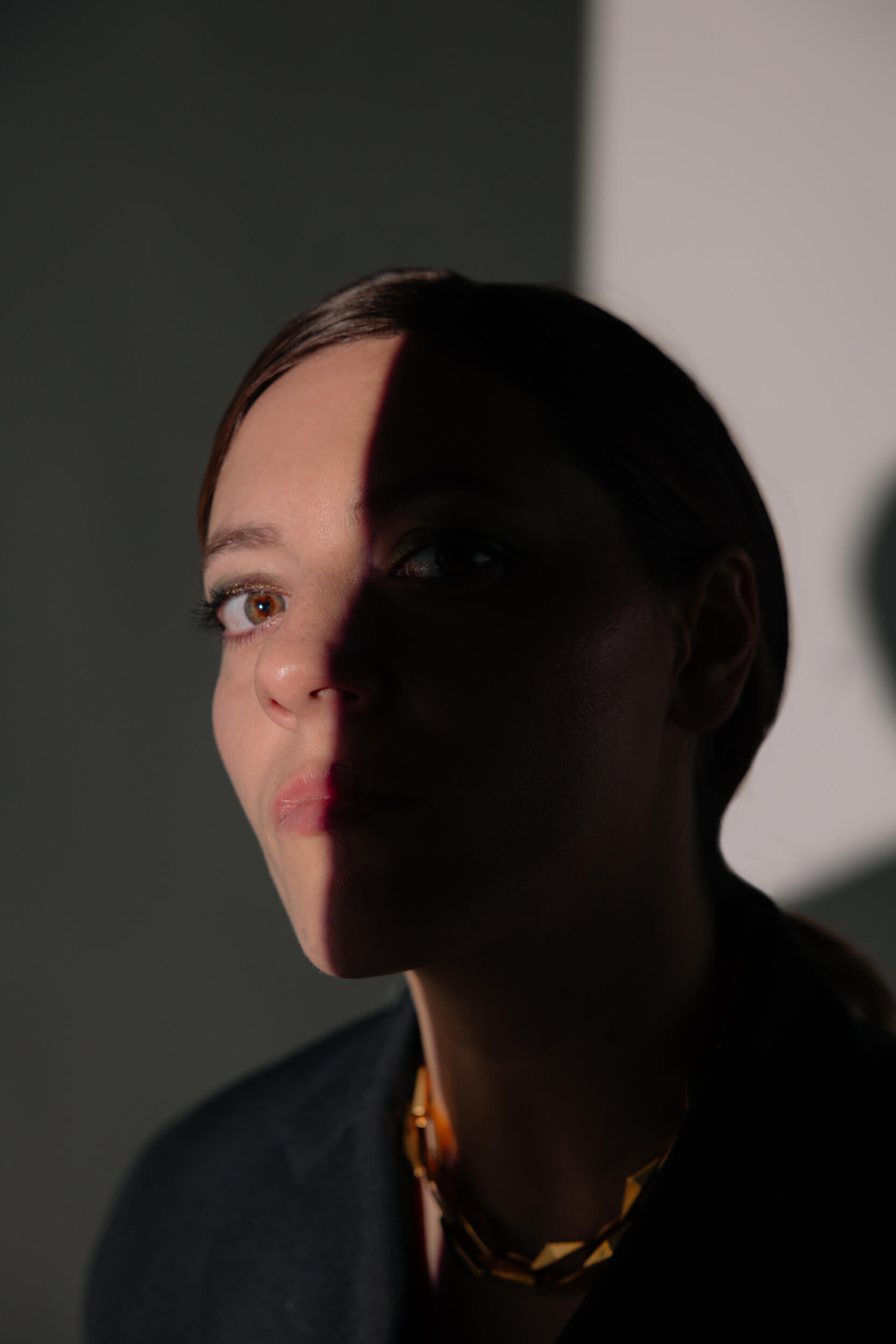
“…when you play a character, you mustn’t judge them, and this is fundamental; otherwise, you can’t empathize”
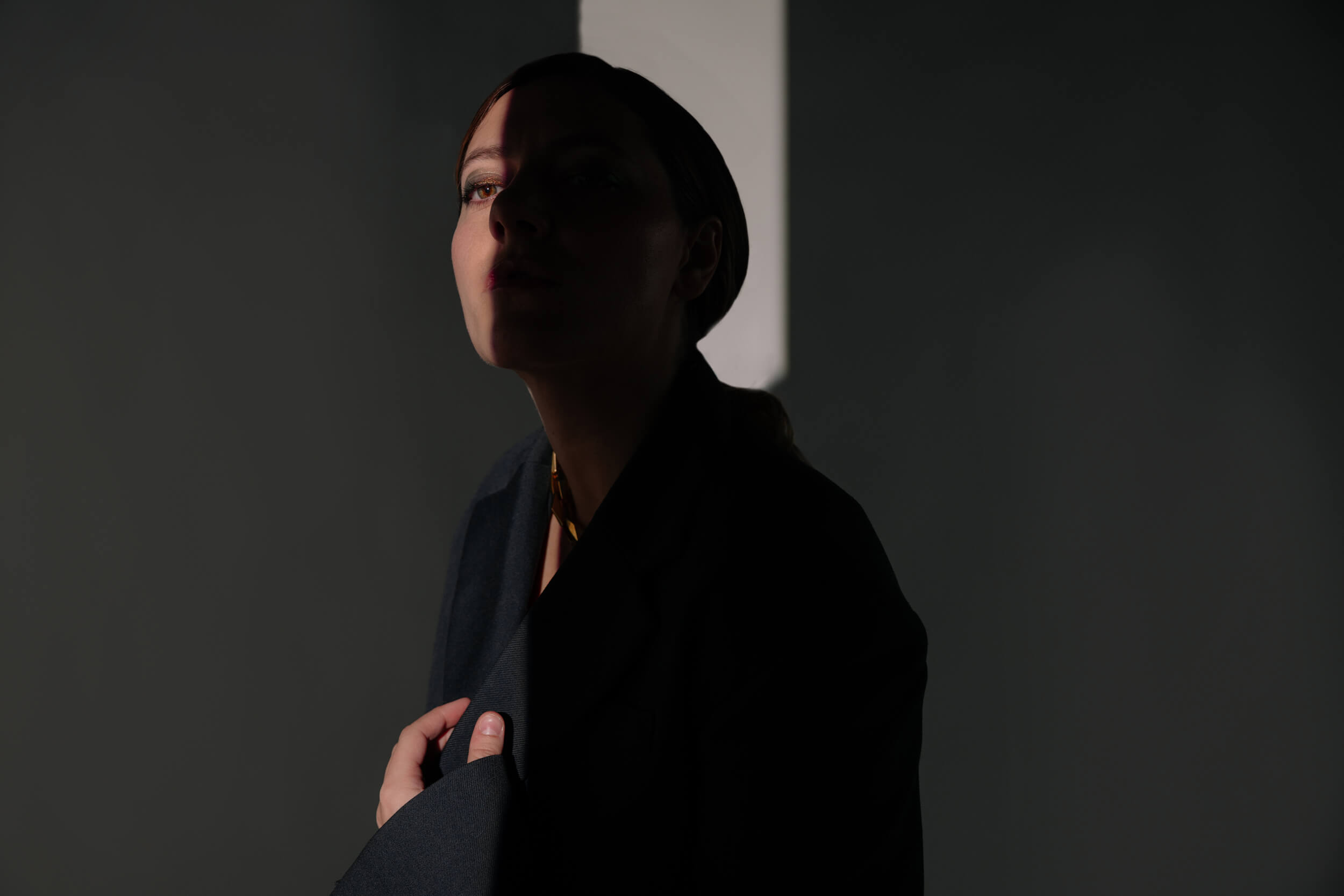
The relationship between Sabrina and Sarah is central to the narrative. How did you build the dynamic on set with the actress who plays Sarah, considering the transition from the familial bond to the explosion of tensions and conflicts?
In the series, there are many scenes of hugs and cuddles because Sarah needed cuddles, and I, Giulia, am very maternal, so both during and off filming, I cuddled Federica [Pala] a lot, just like she was a little cousin or younger sister. When we would go out to dinner with the whole cast after filming, I always called her to ask if she wanted to come with us; I tried to build a genuine relationship with her.
In the series, Sabrina’s envy towards Sarah comes later; at the beginning, especially in the first episode, there are some jabs here and there, but there is a calm relationship between the two. There’s a particular scene that left an indelible mark on me, the concert scene. There are Sabrina and Sarah dancing to “Who Wants To Live Forever,” but there are also Giulia and Federica having fun: everything is calm, it’s summer, the village’s White Night, and nothing has happened yet. At that moment, I would have liked to stop time: for a moment, I detached from what I was doing and, looking at Federica, I thought, “Oh God, I would love to stop time here.” The magic between actors, in my opinion, is created precisely in those moments when you forget what you are doing with a certain awareness because the actors must be aware when performing their actions. But then somehow, magic happens, and you let yourself be surprised by the moment. Even now, as I talk about it, I get chills, and I think all this reached the audience.
It’s one of the most beautiful scenes in the series, even when the idyll is interrupted by Ivano’s furious arrival.
That’s the beginning of the end.
By the way, is there a specific scene or dialogue you found particularly significant in understanding your character?
The Sabrina I portrayed is a human being characterized by a certain polarity: it’s as if her mind were a coin with two sides, a plan A and a plan B. During filming, I felt the polarity of her being: Sabrina is a determined girl, but at the same time full of insecurities that made her fragile. There’s the Sabrina fascinated by cameras, wanting to communicate to the world that “she exists,” that “she is there too,” and there’s the Sabrina who succumbs to her dark side.
There’s a scene where Sabrina and Cosima are together, and Sabrina is trying on pants, and her mother tells her, “Are you still wearing these pants? How much did you spend on these pants?” That’s when I understood how much of a diva Sabrina was because she responds to her mother, “Ma’, am I supposed to wear the same things all the time? I’m going on television, and what should they say?” She wanted to receive positive judgments from people, from all over Italy, because she would be on TV. But then there’s the final scene of the second episode, when she goes down to Sarah’s little altar and looks at her, saying, “Tomorrow I’ll take you to the sea”: that’s when the character’s fragility emerges. And not only that, Sabrina tries to call her, but Sarah isn’t there, Sarah doesn’t answer, the answering machine picks up: in that moment, there’s a Sabrina who feels remorse, even if she doesn’t want to admit it to herself. This character lives with continuous contrasts, with polarity, always having a double face present in all her lines, as if there’s always a subtext as if the words spoken aren’t her main goal. Moreover, in this series, Sabrina’s physicality is shown a lot, and I interpreted that physicality as the external manifestation of her insecurity. There’s a scene, for instance, at the end of the first episode, where Sabrina looks at herself in the mirror and pinches her belly: I remember that day when I got home, I had many marks on my belly, wounds that remained, bruises, showing that that moment in the story was a trauma, not only emotionally. That scene was didactic, and when there are didactic scenes for an actor, it is a great fortune because, as I said before, you recite the lines and live them, and the difference lies between saying the lines and living the lines.
I choose to live the lines, but when I read the stage directions, I realize that this is where the character emerges because you draw their emotions through the stage directions. Going back to that scene in front of the mirror, the script said, “Sabrina looks at herself in the mirror and compresses her belly,” and when I performed it, the character took over:
the magic of this craft comes from those stage directions that make you travel.
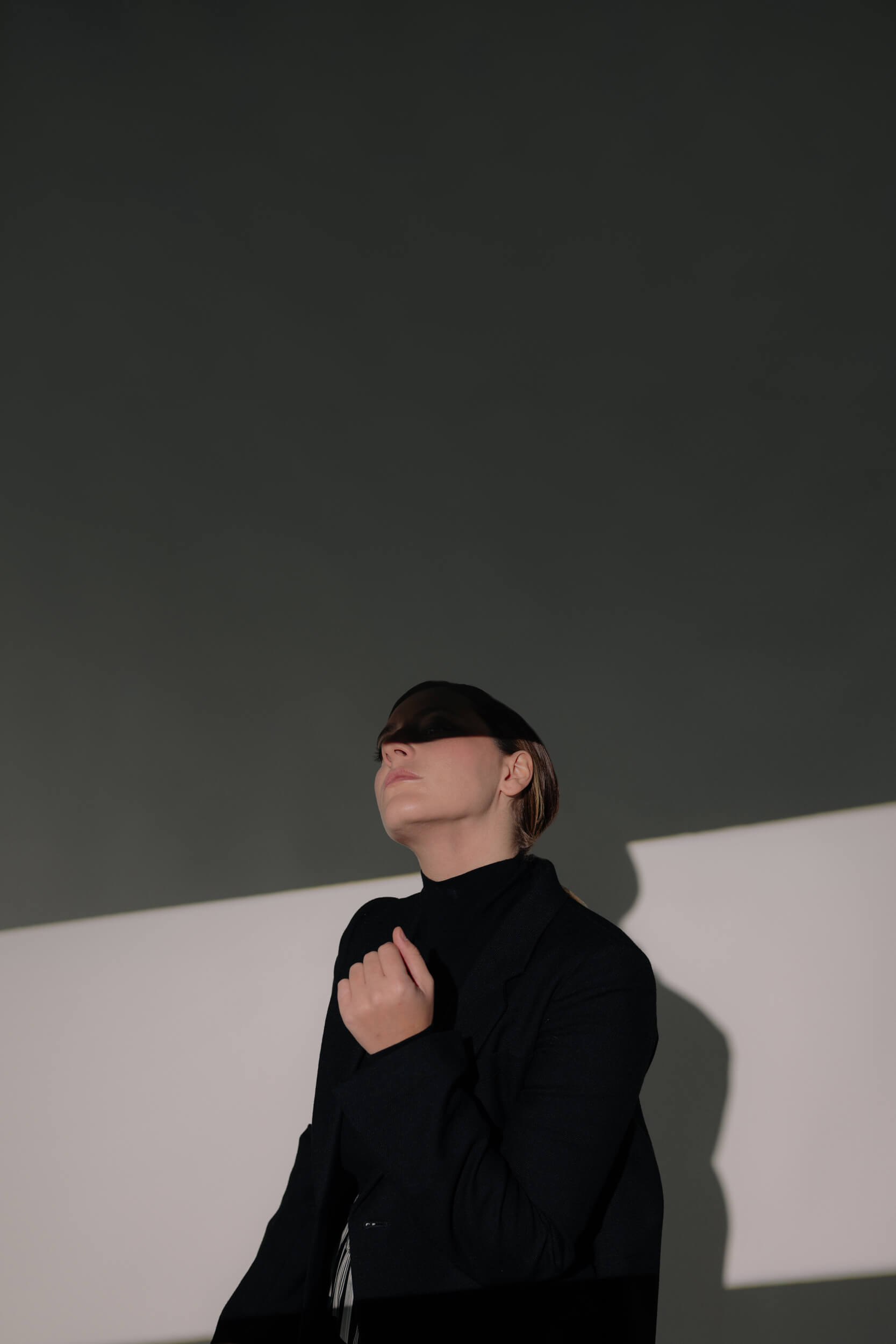
“as if there’s always a subtext as if the words spoken aren’t her main goal”
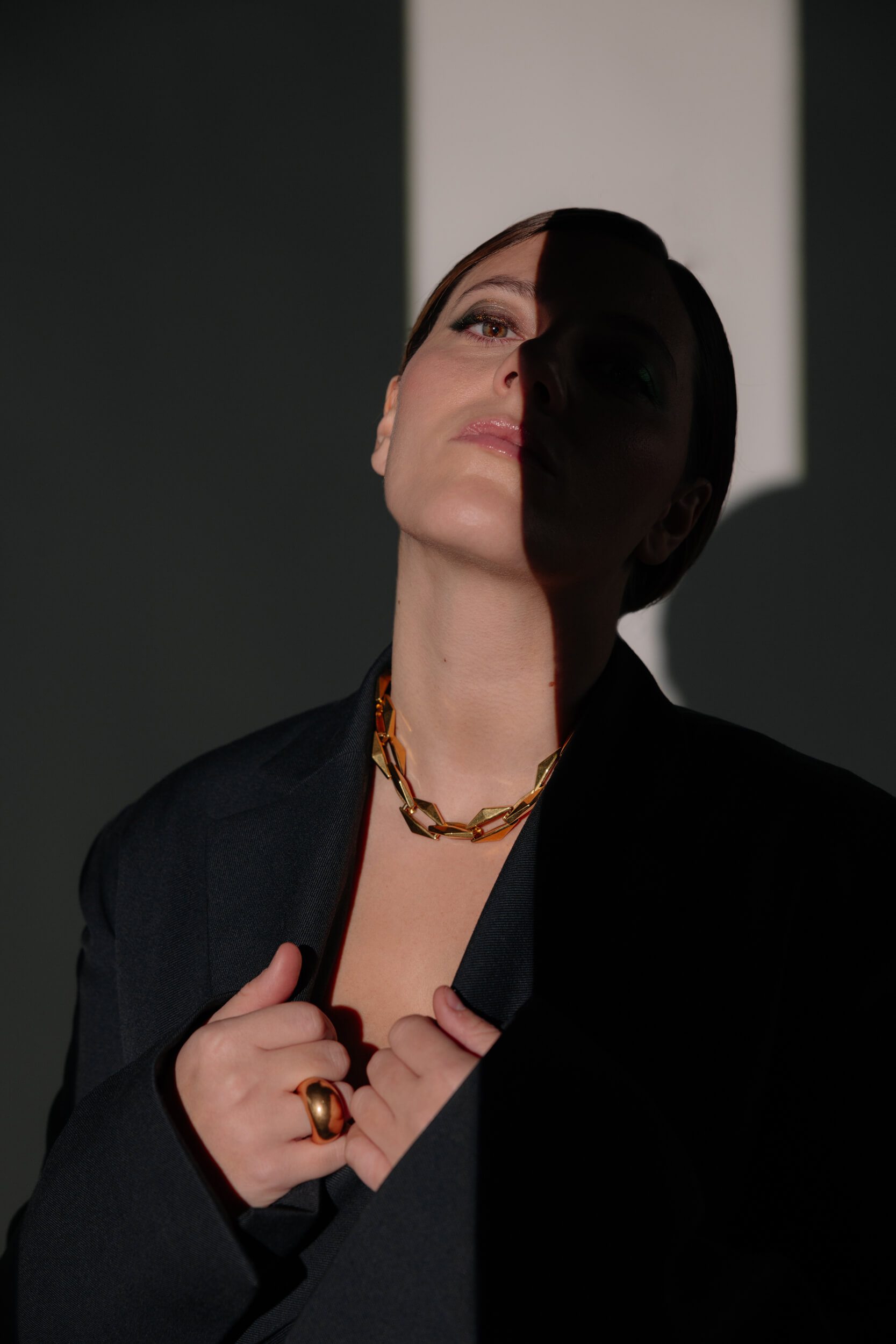
The phrase “this is not Hollywood” seems to be a manifesto of the tone of the series. In your opinion, how does this production stand out from other series that deal with true crime stories? What can this series teach us about the relationship between true crime and media sensationalism?
Let’s start with the premise that I often hear about target audiences, as if this series somehow hit a precise target as if it fascinated viewers who already knew about the Avetrana crime.
I am surprised by how this series has captured a rather broad audience: the ratings speak for themselves, it is one of the most-watched series in Italy, and I am very grateful for that. Basically, I think it has captured an interested audience, who have engaged and been surprised by how the series delves into the psychological aspect of the characters, regardless of the case itself, because it adheres to the procedural truth. But I also believe the audience was captivated by the psychological aspect of the characters, told through their physicality, their attitudes. The entire cast did significant work on the characters’ attitudes, and it is gratifying how the audience recognized and appreciated our commitment to delving deeply into the characters.
What this series leaves, aside from sensationalism, is the memory of the victim before anything else, considering that unfortunately in crime cases, the victims tend to always come second. In this series, we give a memory, we give three-dimensionality to Sara’s figure. In some ways, without judging the Misseri family, we have also told the psychological aspect of the other characters who, like it or not, are the “second victim”: they ruined their lives and are, therefore, victims of their dark sides.
Then there is a third victim: Avetrana, a town marked by a worldwide crime case that everyone knows and that unfortunately is remembered for this affair.
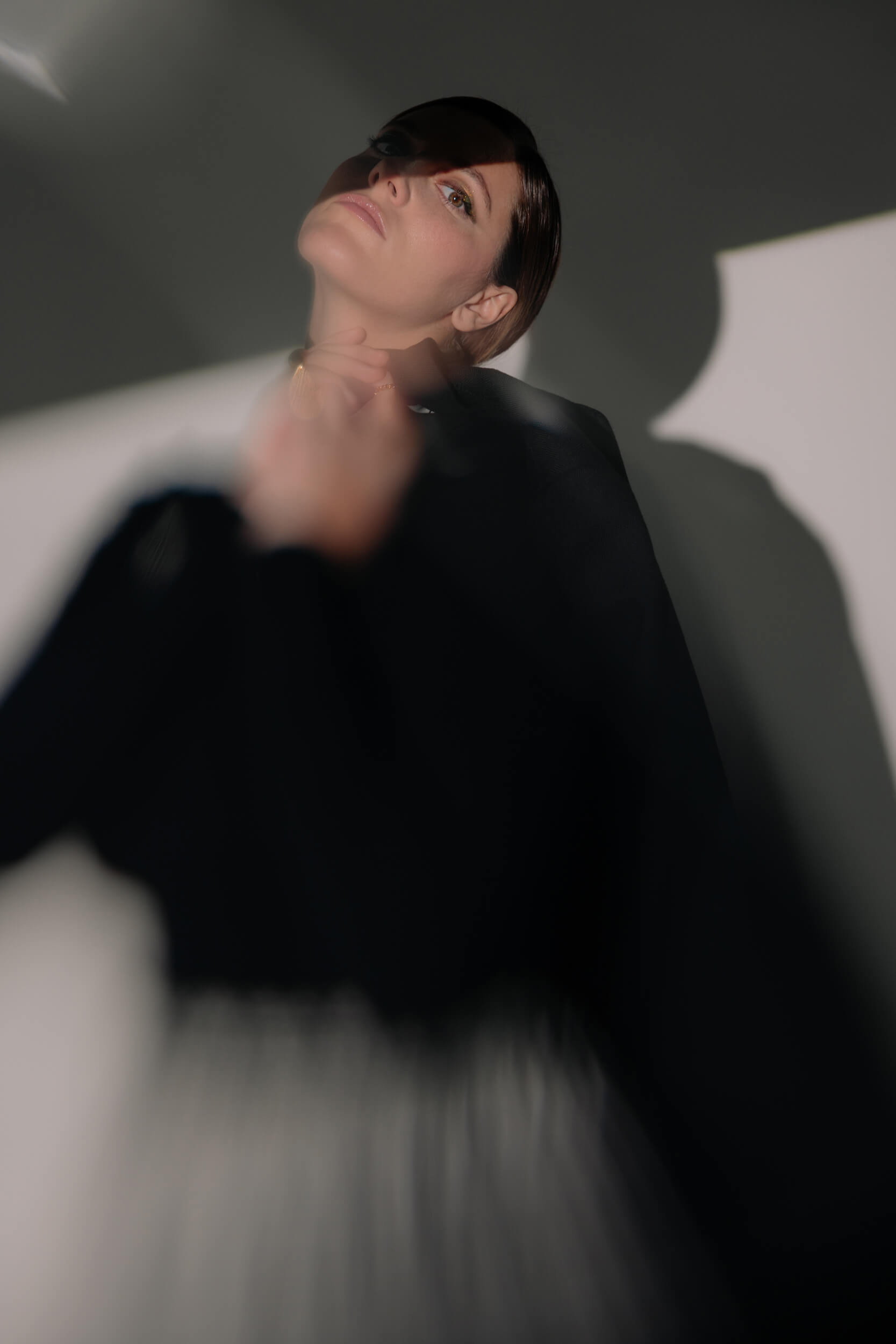
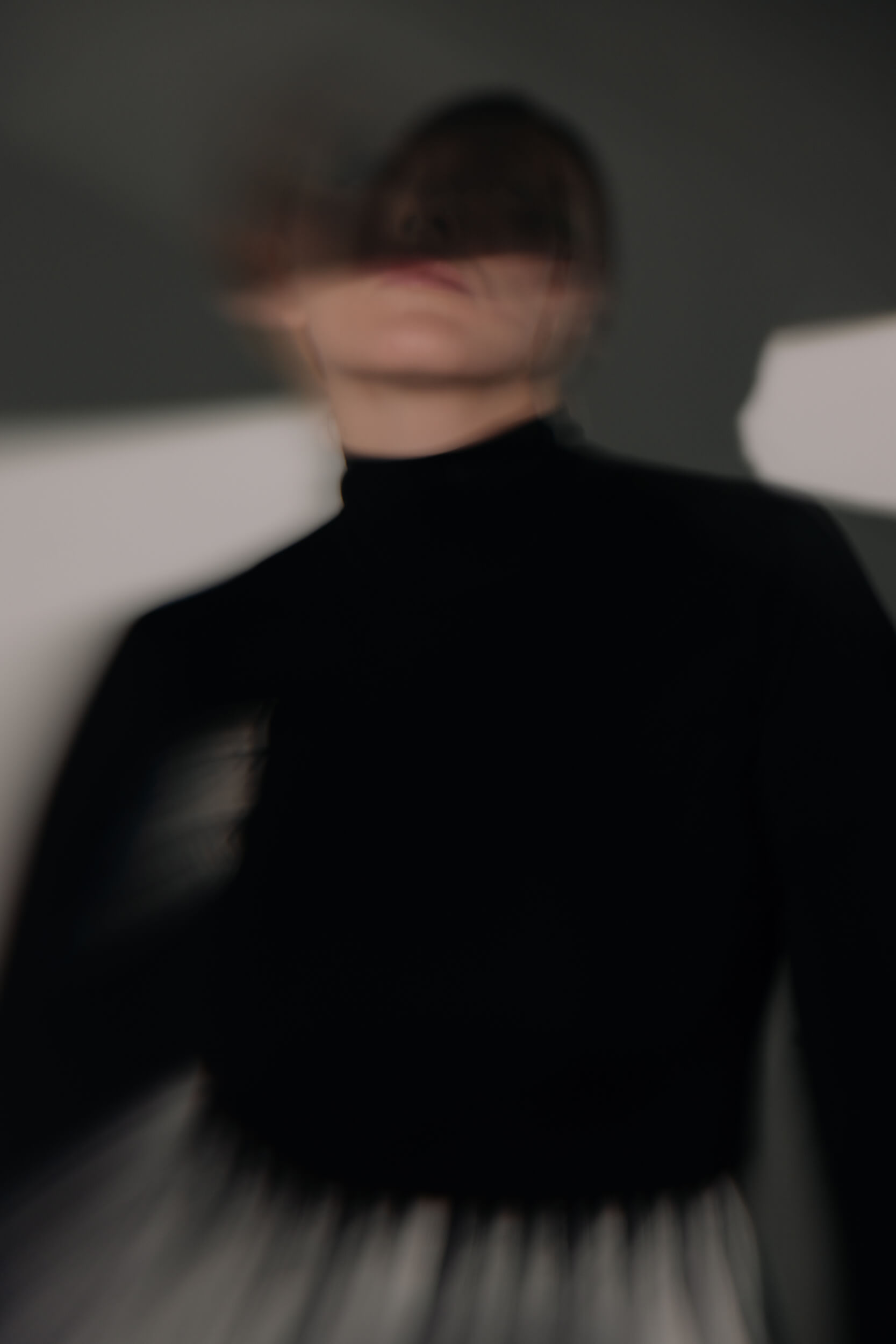
What emotions do you hope the audience feels towards “your” Sabrina while watching the series? Compassion, anger, doubt?
I am receiving very positive feedback from an acting perspective. The audience recognizes an actress who fully committed herself, who gave all of herself to the character. From the character’s point of view, I think the audience sees a Sabrina who sometimes annoys, who makes them very angry and even seems unsympathetic. Sabrina is brazened in this series; she can be very annoying, but on the other hand, Sabrina is a girl full of insecurities, fragile. You know, sometimes when we watch a film, we empathize with the villain, right? Even for a moment, the villain sometimes makes you feel a little sorry for them. That’s what I felt for my character, a lot of pity because she is a girl victimized by her emotions, but also annoyance because her extreme jealousy really got on my nerves.
Sabrina is a victim of herself, and in this series, we have told just that, how much.
Did you discover anything about yourself as an actress by playing this role?
I think there is a pre-Sabrina and a post-Sabrina in my life.You know, I studied acting, and for a while, I also attended the Centro Sperimentale, so I know the technique of this craft. Then, of course, an actor is like an athlete; they have to train every day, but knowing the technique, you know how to leave the character on set. Maybe for a role, you wear a wig, and at the end of the shooting, you take it off, leave it on set, go home, and you are yourself again. In this series, for obvious reasons, it was not possible for me, starting with the character’s physicality. It is not a negative physicality in itself, meaning I don’t think a girl with that type of physicality should feel uncomfortable: the discomfort comes from simply having to live in a body that isn’t yours. I carried that discomfort inside for many months, and then, once the filming was over, I went home, but I was still “that thing,” I was still the character. So, I continued with that physicality, those insecurities, that brazenness for several months even after the series ended. Then I grew my hair back, started a weight loss diet, and pulled the handbrake with the help of my nutritionist, whom I thank: only then did I start to see Giulia in the mirror again, after having taken a journey.
And when you take a journey, that experience stays inside you.
You carry within the emotional scars of what you have lived, the excitement of the experience you had, the responsibility you carried. Now, in the post-Sabrina, I feel more mature in some ways, I feel I have grown. I look at my face and see it marked by the experience. This is fundamental for an actor because we travel with this suitcase full of emotions, we carry it with us, and it blends with life, there’s nothing to be done, and it’s beautiful. It is one of the joys of this job, studying the human being.
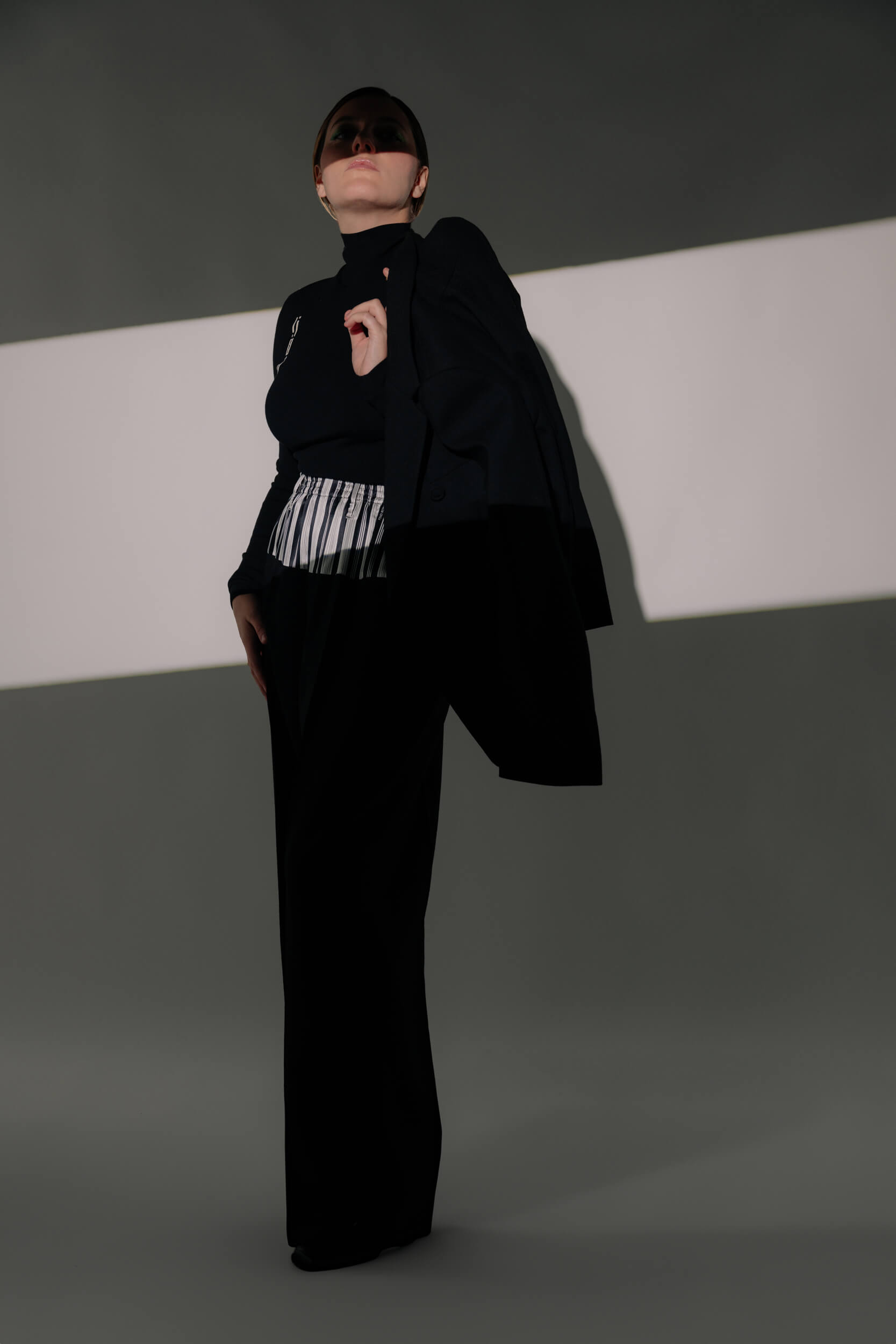
“We travel with this suitcase full of emotions, we carry it with us, and it blends with life, there’s nothing to be done, and it’s beautiful”
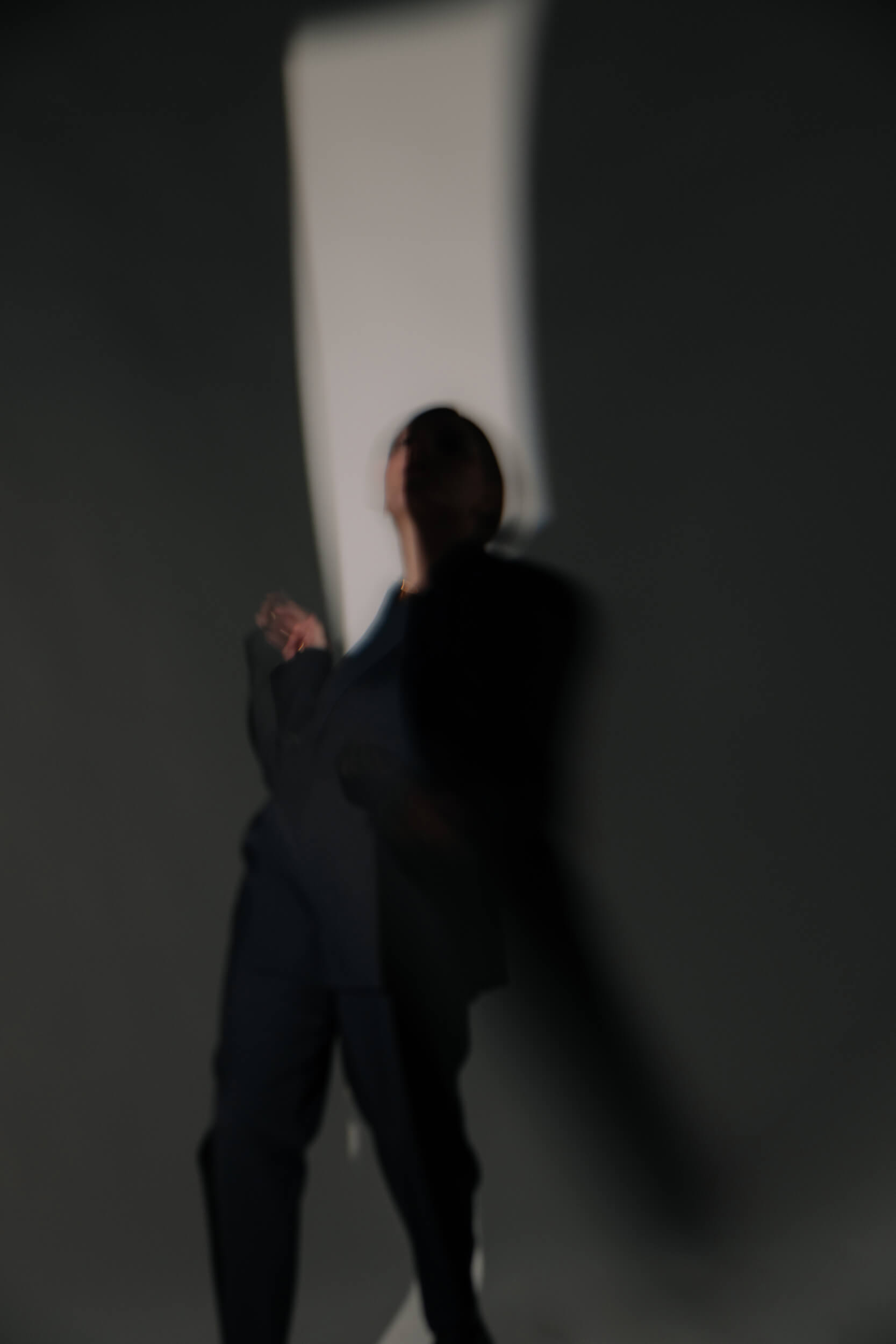
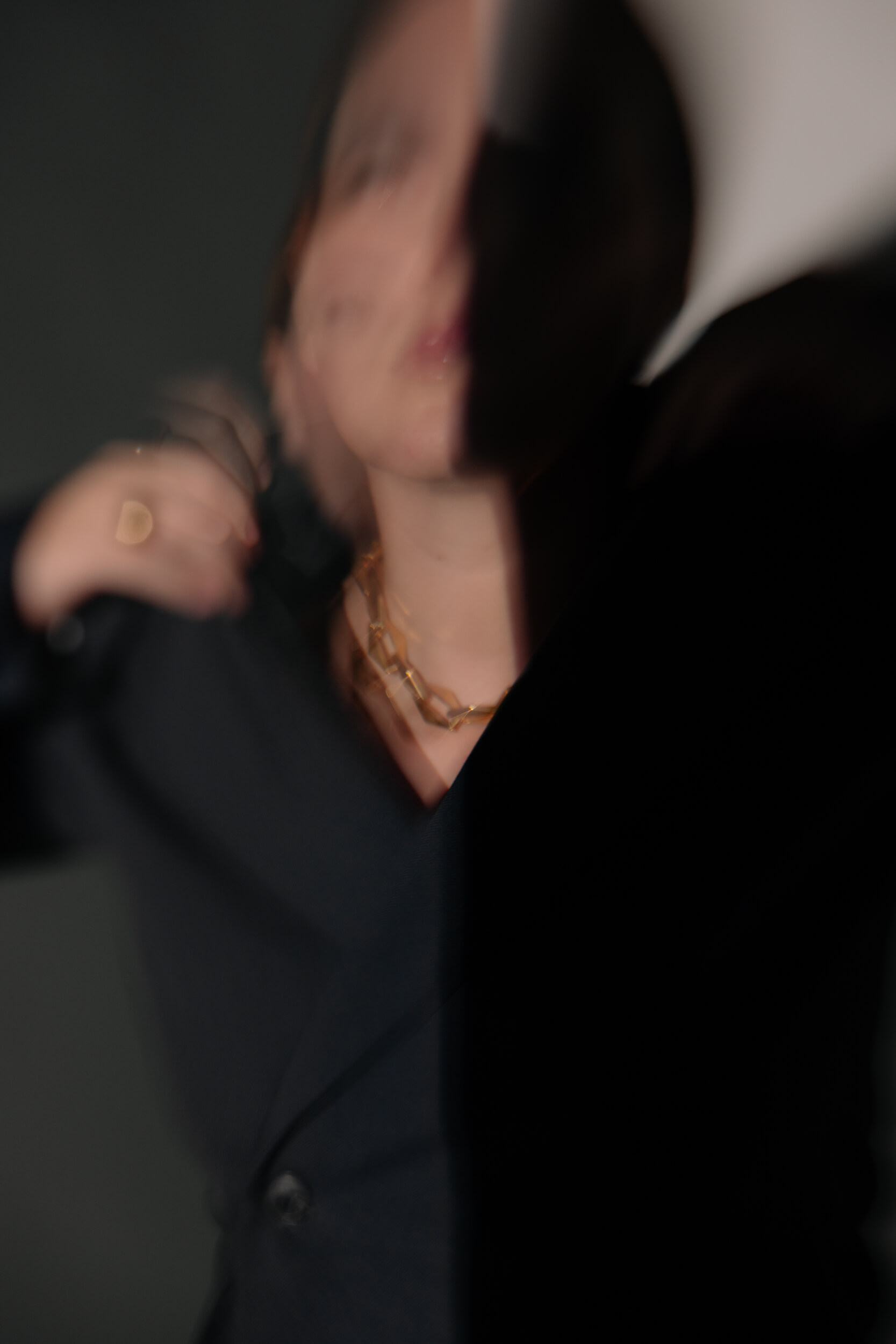
Sure, you learn to know them better and, consequently, to know yourself better.
An epic fail on set instead?
The nude scene of Sabrina, the walk through the town.
The scene isn’t really an epic fail, actually, I think it’s one of the main scenes of the series; in fact, I thank Pippo Mezzapesa and his visionary nature that projected the image of Sabrina with her fragility. That scene is the peak of Sabrina’s fragility.
But I remember that day, the crew wouldn’t look me in the face [laughs]. When I arrived on set to shoot that scene, I had a bathrobe on, and underneath I had nothing, obviously: I was walking in a bathrobe, and people wouldn’t look at me. The set was halved, of course, because it’s a very delicate scene for an actress, and at that moment, I was focused on what I had to do, but as always, I greeted everyone, I was as sociable as ever, friendly with everyone, because I like to be in company, to live the set. At one point that day, I looked at the camera operator, who usually gave me directions, told me how to look where, but he didn’t say a word. In the end, I explicitly asked: “Guys, did I do something wrong, did something happen?” I think they were embarrassed because I was naked [laughs]. But they were more embarrassed than I was, in the end, because I wasn’t really showing my body; it was as if I had a suit on.
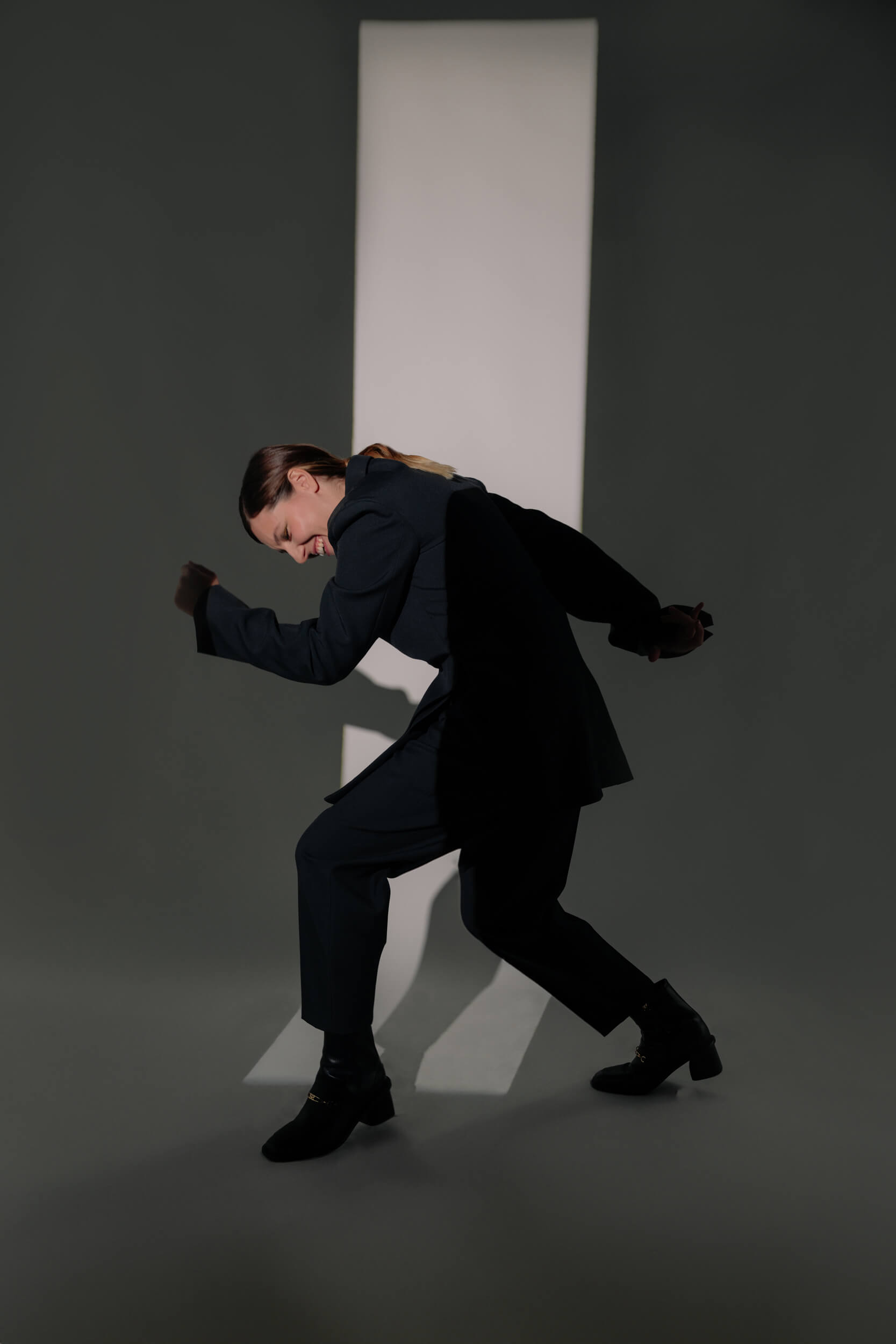
Your biggest act of rebellion?
When I was in the second year of a technical commercial institute, I decided that I wanted to change schools and go to a technical audiovisual institute that was more consistent with what I was starting to like at that time, with my hobbies. When I told my mother, she replied, “No, as long as you’re not failing, you won’t change schools.” What does Giulia do? She gets herself to fail [laughs].
Then I still caught up in the last year when I had to do the fourth, I did two years in one because the goal was to leave home, move to Rome, and pursue cinema.
Your greatest act of courage instead?
I think I had the courage at the moment I decided to take the risk of living my dreams. Let’s be honest, this is not an easy job; it is difficult to establish yourself. Living this dream is not something everyone does because people often give up, they get lost along the way. But I, even at a crossroads, have always chosen the path of cinema. For me, cinema is a kind of calling; it draws me in and makes me feel comfortable.
I’ll tell you something quite intimate: I never feel right, I never feel up to what I do or what I have to do, partly because I’m shy but also partly because of insecurity. But on the set of “This is not Hollywood,” I felt right, I felt that I was doing something right not only for myself but for others. I was telling a story, stepping into it gently and then ultimately diving in with both feet.
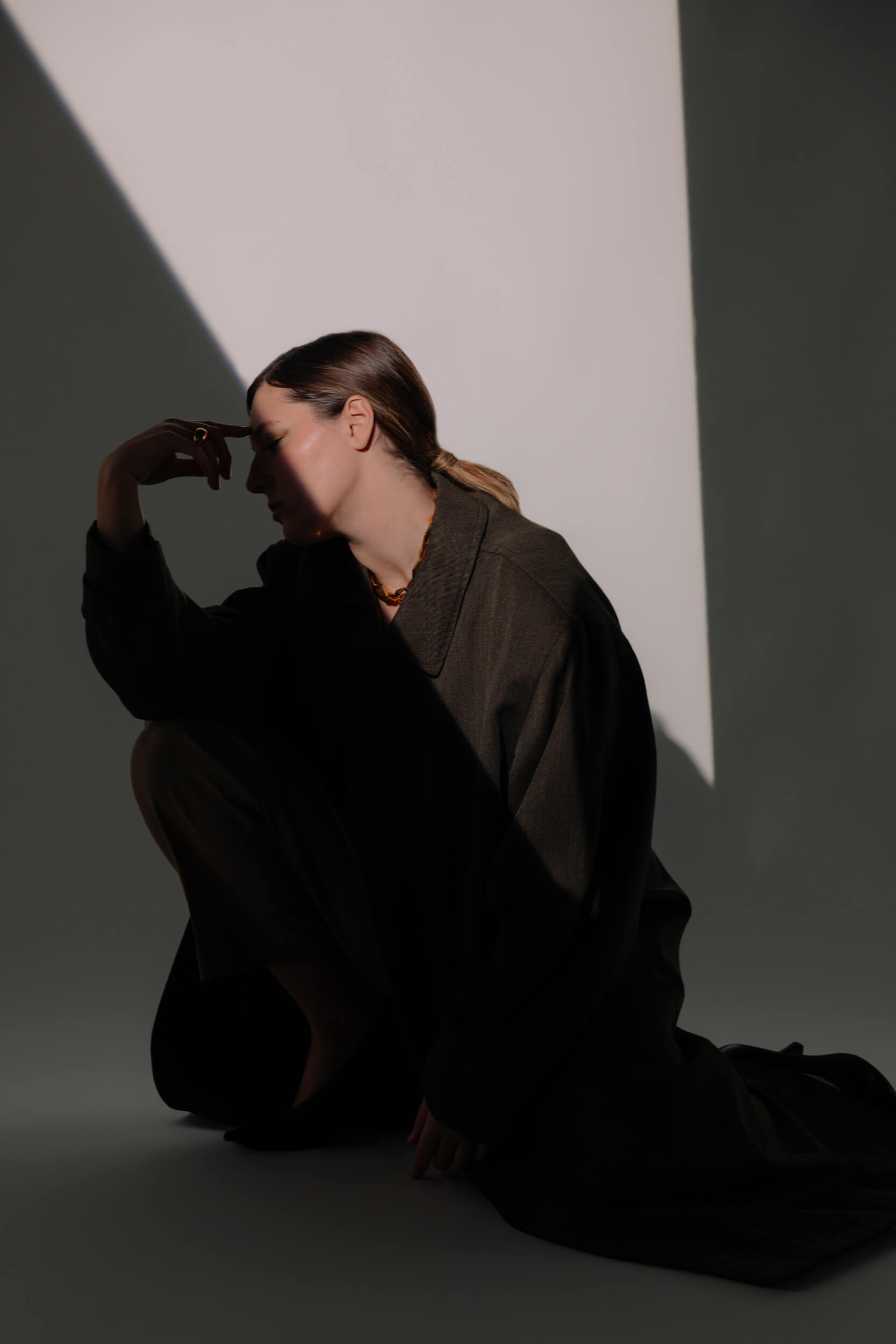
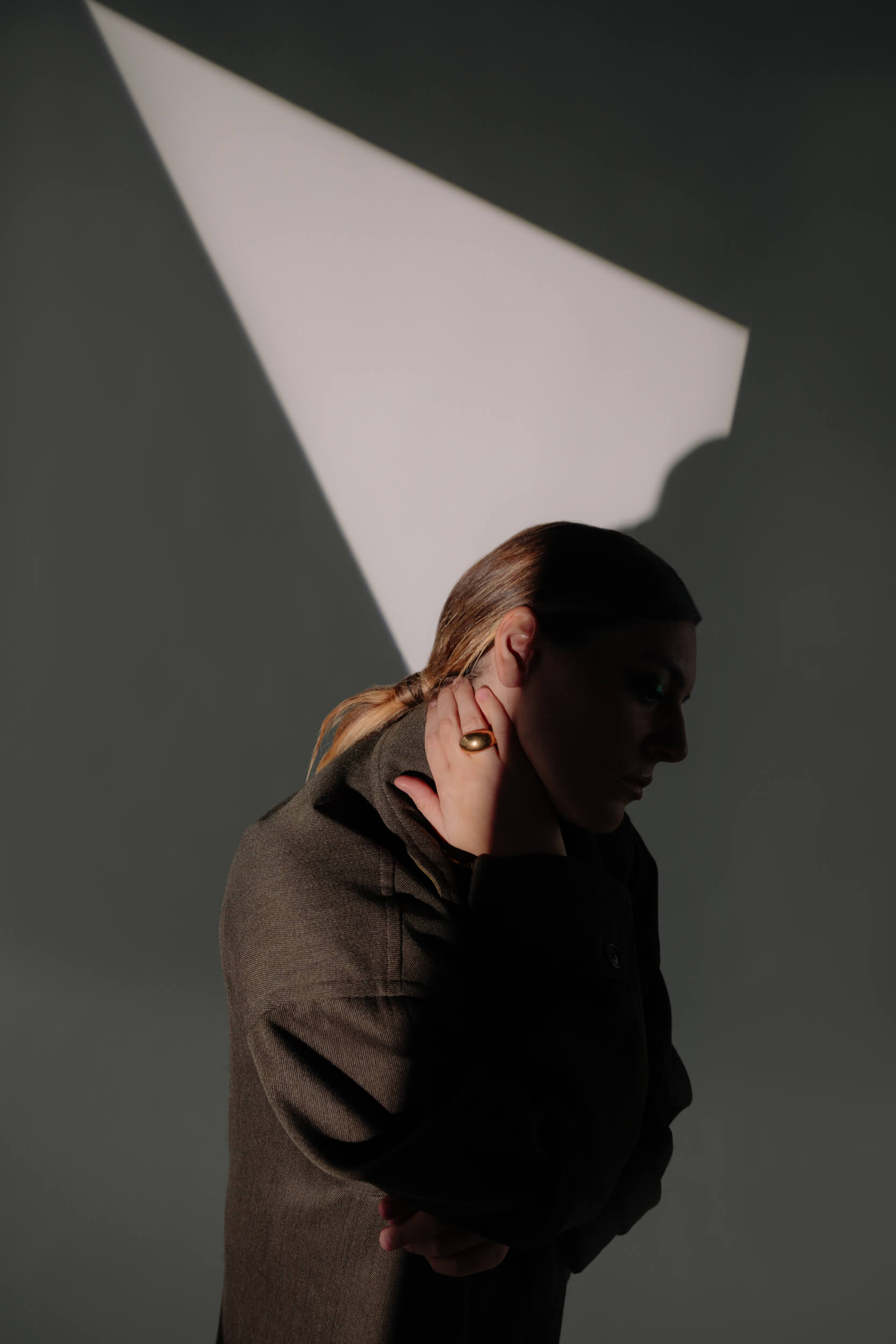
What are you afraid of?
I am afraid of loneliness and often estranging myself.
You know, just as pauses and silences are important for an actor, they are fundamental in my life too. I love silences because I can really take refuge in those pauses and processes. I daydream a lot, but when I have those moments of pause, and maybe you’re talking to me, telling me something, sure, I’m listening, but at some point, I go off on my own tangent. People often ask me, “What were you thinking about?” I don’t know, I don’t know what I was thinking about, but who knows, thoughts intertwine, they mix.
I fly a lot with my imagination; it’s the place where I feel true, in this now artificial world. So I try to take refuge in those pauses, in those silences.
What does it mean to you to feel comfortable in your own skin?
My skin is what surrounds me. I try to feel comfortable with the chair I have at home rather than with the plate of pasta I cook (because I love cooking). I try to feel comfortable with what surrounds me, making external objects what I live and what I am.
At this point, I would say my skin almost takes a backseat, it’s less important than the external because I am someone who is very much outside of herself. I try to be in listening mode, to listen, to welcome, maybe because I am very maternal. I always try to welcome, to be there, to be present not only to myself but to the people around me. So that is my skin, let’s say.
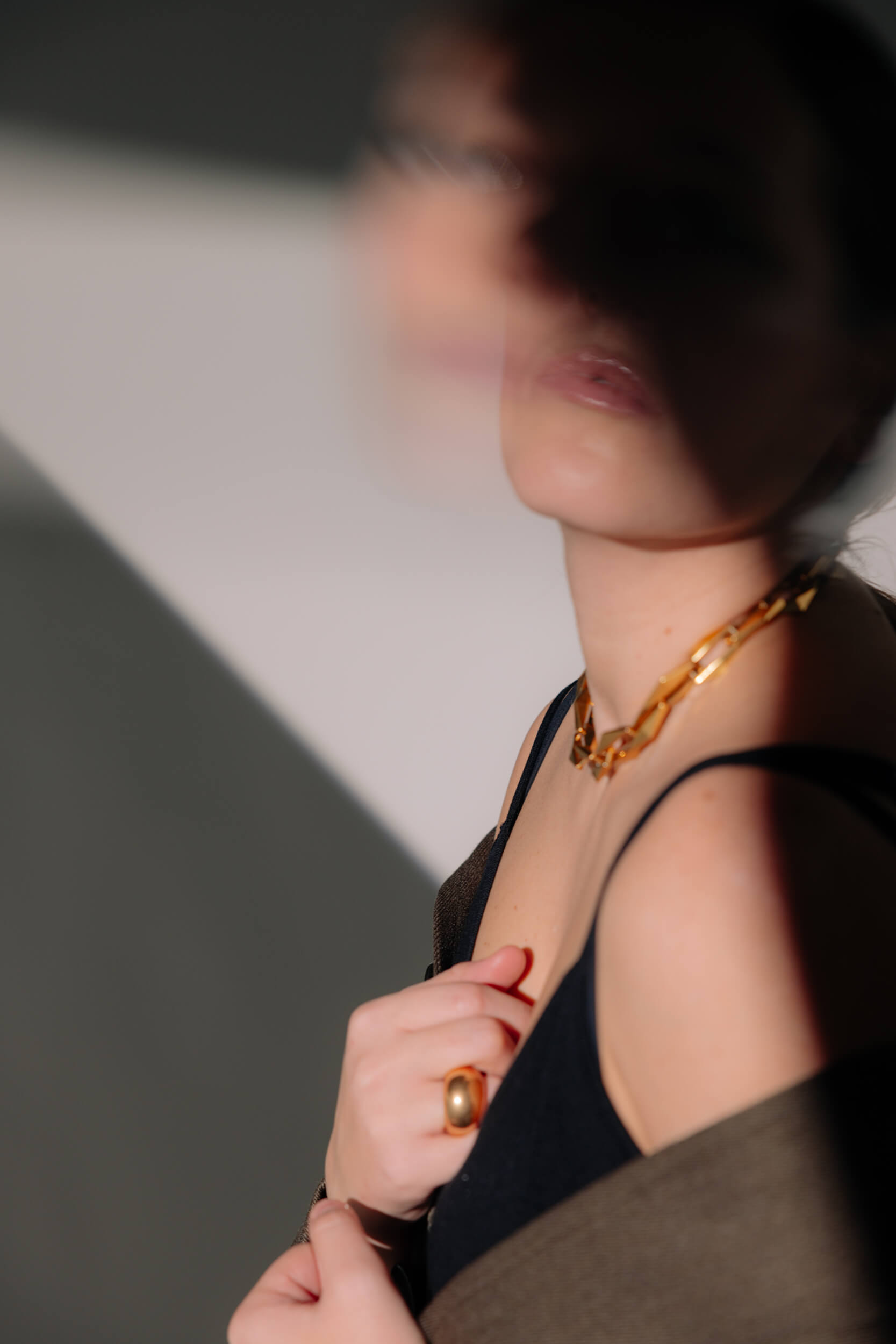
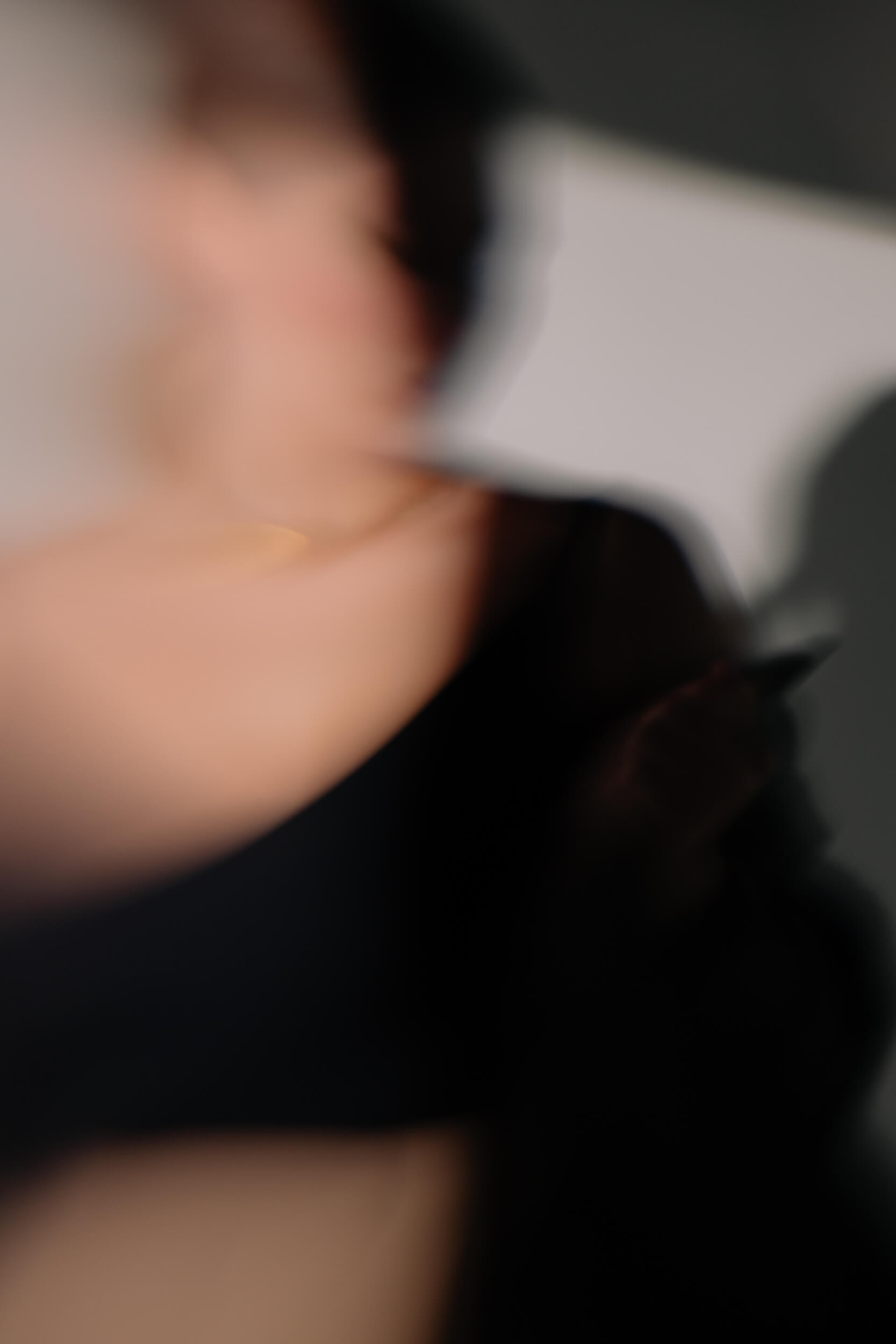
Do you have any future projects you’d like to tell us about?
It’s all a work in progress. “Qui non è Hollywood” gave me the chance to challenge myself with this incredibly difficult role, and now more people have realized that “there’s someone who might be able to do this job” [laughs], so the perception others have of me has changed. I’m now able to audition for leading roles that used to be just a dream for me. I won’t say more for good luck, but now it’s time to move forward, trot, run. The world moves fast, and you need to keep up if you want to leave even a small mark.
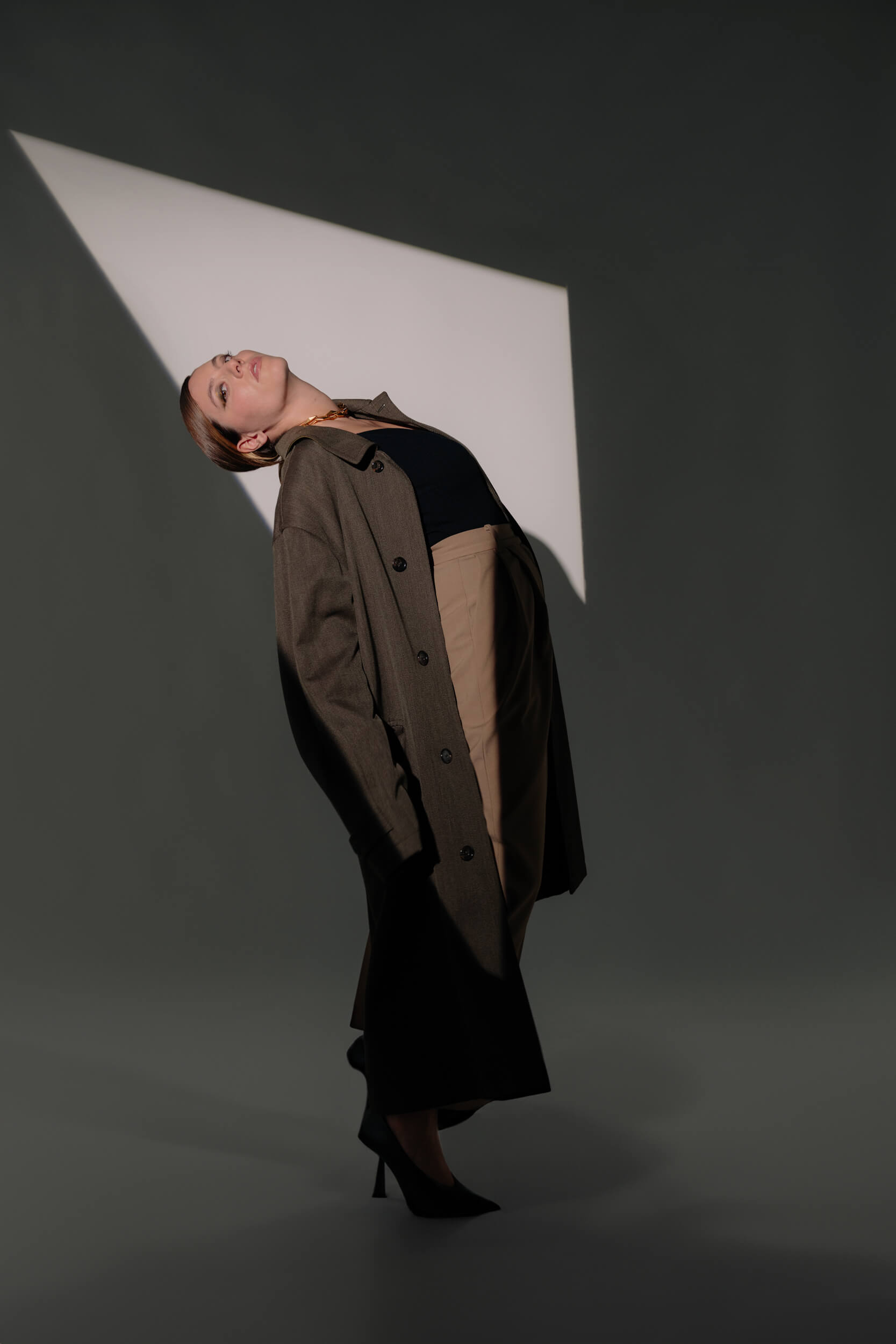
One last question: what’s your happy place?
My happy place is with the people I love, my friends, my Lecce, my Salento, the sea of my Salento where I often find refuge. It’s being down there with my family and friends, with a glass of wine.
I’m content with simple things, which I believe are the most beautiful.
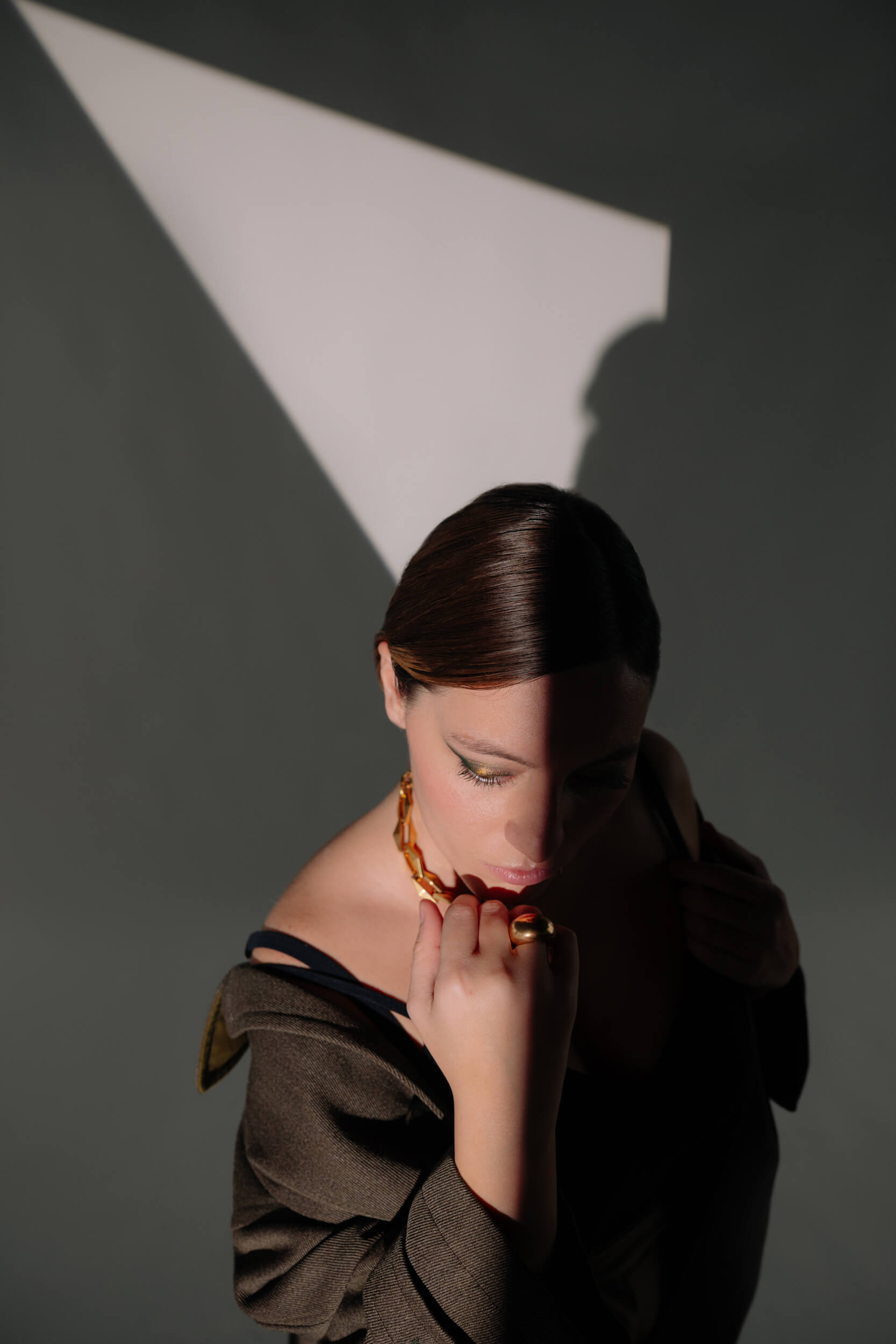
Photos by Johnny Carrano.
Makeup & Hair by Maddalena Pasquini.
Styling by Sara Castelli Gattinara.
Thanks to Other Srl.
Thanks to Village Studio Rome.
LOOK 1
Total Look: Fay
Shoes: Jimmy Choo
Accessories: Jimmy Choo
LOOK 2
Total Look: Fendi
Shoes: Jimmy Choo
Accessories: Jimmy Choo
LOOK 3
Total Look: The Frankie Shop
Shoes: Jimmy Choo
Accessories: Jimmy Choo

